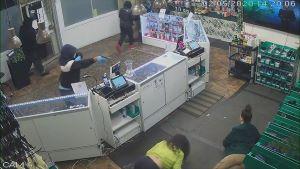As the lame duck congressional session ticks down toward its final days, not only have prospects for Senate Majority Leader Chuck Schumer's marijuana legalization bill faded into misty nothingness, even the more incremental but much clamored-for effort to provide state-legal marijuana businesses with access to the banking system remains undone.

While Congress dithers, marijuana retailers, especially in the West, have been paying the price of having to operate with extremely limited access to the banking sector. As a new report from StoptheDrugWar.org (publisher of this newsletter) executive director David Borden demonstrates, that price is paid not only in stolen cash and traumatized employees and customers, but sometimes in lost lives. The report, Dangerous Delays: What Washington State (Re) Teaches Us About Cannabis Store Robberies analyzes some 165 armed robberies of marijuana shops in the state beginning in 2017, including a spate of nearly 100 reported robberies in a 4 ½ months beginning in late 2021.
"While SAFE was stalling in the Senate [last year], Washington State's cannabis community was in the grip of an unprecedented surge in armed robberies of cannabis stores," the report notes. "This occurrence, which began in November 2021 and lasted 4 ½ months, saw nearly 100 reported robberies affect roughly 80 cannabis stores, and ended with three people dead."
One of those killed was a marijuana shop employee; two were armed robbers.
The data on robberies comes from a unique resource, the "Uncle Ike's i502 Robbery Tracker." Uncle Ike's is a Seattle-area marijuana shop chain that has seen two of its stores victimized, one in White Center in 2018 and one in Lake City in 2021. Its list is compiled from media reports, police reports, and direct communication with store robbery victims.
The study analyzed robberies by whether they targeted cash or product or both; and for those that targeted cash, whether they aimed only at cash registers (front of the store) or safes (back of the store). It also examined the relationship between robbery targets and levels of aggression by robbers.
"Our analysis confirms that cash dominates as the target for cannabis store robberies," the report's executive summary says. "Product also plays an important role, but almost always in combination with cash; whereas cash on its own gets targeted in roughly 50 percent of the time, during the incidents for which we could determine what was targeted. Most burglaries, by contrast, appear to only target product."
The report also concluded that:
- Based on current incentives, there is little reason to believe that robberies targeting the back of a store will continue (as opposed to burglaries), or continue at the same level, if cash is removed from the equation. The great majority of such robberies are aimed at accessing cash in the safe, and without cash or with much less of it, that will no longer be lucrative.
- There will also be much less incentive to target the cash register at the front of the store, in the absence of strong profits there. Those are roughly half of the documented front-store robberies on Uncle Ike's. There's little reason to believe that front-store robberies targeting only cash will continue in that scenario.
- Data finds few examples of product-only robberies (as opposed to burglaries which are mainly product-only). That may suggest product alone does not provide enough incentive to sustain interest in doing robberies, particularly because burglary is a viable option to obtain the same product.
"Given what happened in Washington -- which could happen again -- it would be wholly unjustifiable for Congress to again put off enacting some form of the SAFE Banking Act," said Borden. "But there will be more left to do after Congress passes SAFE, for the robberies problem to be thoroughly addressed," Borden continued. "One remaining piece is to specifically greenlight purchase transactions, which is how cash enters the system. The current language of SAFE explicitly addresses only depository banking."
While the prospects for passage of the SAFE Banking Act grow dimmer each day, there remains the chance that the SAFE Banking Act Plus, which Schumer has been negotiating for the past several months and which also includes social equity provisions demanded by activists and some lawmakers, could move as a standalone measure before the session ends.
But if it doesn't move, the marijuana shops will remain at risk. There are steps that can be taken to ameliorate that risk, the report says.
"Security, worker training, and likely other factors, will continue to have importance for cannabusinesses, regardless of what happens with SAFE or further measures," the report states. "In the meanwhile, the cannabis community in other states can help, by duplicating the tracking effort pioneered in Washington by Uncle Ike's." Also, stores should improve employee training "with respect to emphasizing the reasons for cooperating with robbers and how to avoid escalating tensions in robbery situations."
States, for their part, should "provide funding for security measures to small and midsize cannabis stores," the report adds, and at the state and federal level, regulators should "review their policies with an aim toward facilitating greater adoption of electronic payment for cannabis stores."
Or Congress could just legalize marijuana.
12/16 report launch webinar:
This work by StoptheDrugWar.org is licensed under Creative Commons Attribution-ShareAlike 4.0 International
Add new comment